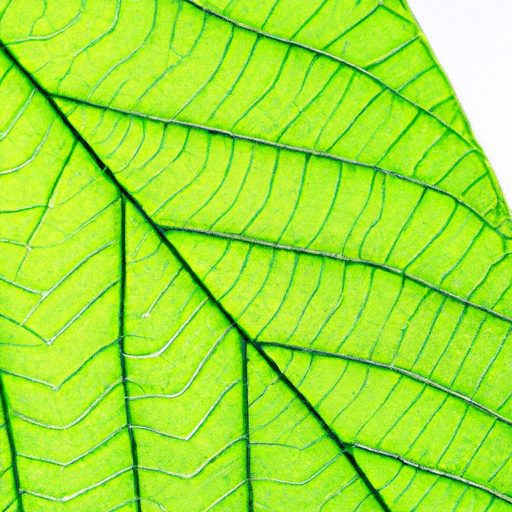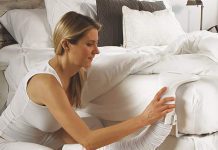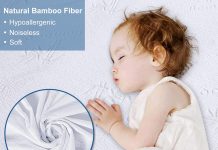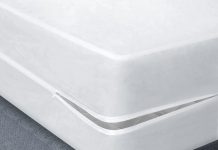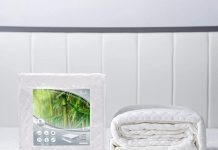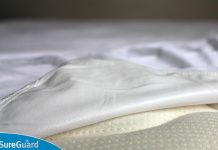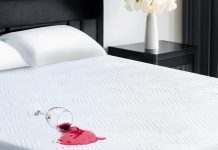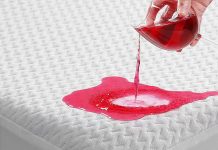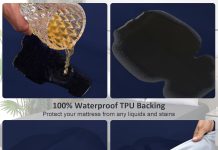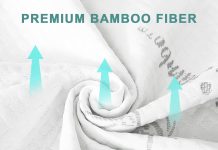Looking to protect your mattress in a way that’s environmentally friendly and chemical-free? Wondering if there are any organic or natural options available? Well, you’re in luck! In this article, we will explore the world of mattress protectors and discuss whether there are any organic or natural alternatives out there. So, if you’re ready to learn more about how to keep your mattress healthy and protected in a sustainable way, read on!
Review contents
Types of Mattress Protectors
When it comes to protecting your mattress, there are several types of mattress protectors to choose from. Each type offers unique features and benefits, catering to different needs and preferences. Let’s explore the various types of mattress protectors available in the market today.
Encasement Mattress Protectors
Encasement mattress protectors provide full coverage for your mattress, encasing it entirely like a second skin. These protectors are designed to protect your mattress from all angles, including the top, sides, and bottom. They are typically made with a zippered closure system, ensuring a secure and tight fit. Encasement mattress protectors offer excellent protection against bed bugs, dust mites, allergens, stains, and spills. If you have allergies or asthma, encasement mattress protectors can provide an extra layer of defense against these triggers.
Fitted Mattress Protectors
Fitted mattress protectors are similar to fitted sheets, as they feature elasticized corners that easily slip over the corners of your mattress. These protectors are designed to stay in place while providing a barrier against dust mites, allergens, and spills. Fitted mattress protectors are typically made with a waterproof or water-resistant layer, which adds an extra layer of protection to your mattress. They are easy to remove and machine washable, making them convenient for regular maintenance.
Strap-On Mattress Protectors
Strap-on mattress protectors feature adjustable straps that secure the protector to the mattress. These protectors are versatile and can be adjusted to fit mattresses of different depths and sizes. The straps ensure a snug and secure fit, preventing the protector from shifting or slipping during the night. Strap-on mattress protectors are often made with hypoallergenic materials and provide protection against allergens, dust mites, and spills. They are a popular choice for individuals who want a secure and hassle-free mattress protection solution.
Zippered Mattress Protectors
Zippered mattress protectors are similar to encasement protectors but offer easier accessibility. These protectors feature a zippered closure system that allows for easy removal and installation. Zippered protectors provide full coverage and protection for your mattress, guarding against bed bugs, dust mites, allergens, stains, and spills. They are typically made with a waterproof or water-resistant layer, ensuring that your mattress stays dry and free from damage. Zippered mattress protectors are a convenient option for those who prefer quick and easy removal during cleaning.
Organic Mattress Protectors
In recent years, there has been a growing demand for organic products in various industries, including the mattress industry. Organic mattress protectors are specifically designed to meet the criteria and standards set for organic products. Let’s take a closer look at what defines an organic mattress protector and the benefits they offer.
Definition and Criteria
Organic mattress protectors are made from materials that are grown without the use of synthetic pesticides, herbicides, or genetically modified organisms (GMOs). These protectors are free from harmful chemicals and toxins that could potentially affect your health and the environment. To meet the criteria for being labeled as organic, the materials used in the protector must be certified by an accredited organic certifying agency.
Benefits of Organic Mattress Protectors
Organic mattress protectors offer several benefits for those who are conscious of their health and the environment. Firstly, these protectors are made from natural materials, which are less likely to off-gas harmful chemicals. This can improve the indoor air quality of your bedroom and provide a healthier sleeping environment. Additionally, organic mattress protectors are hypoallergenic and resistant to dust mites, making them an excellent choice for individuals with allergies or respiratory conditions.
Certification and Standards
To ensure that an organic mattress protector meets the necessary standards, it is essential to look for certifications from recognized organic certifying agencies. These certifications guarantee that the materials used in the protector are indeed organic and free from harmful substances. Some popular certifications to look for include Global Organic Textile Standard (GOTS), CertiPUR-US, and OEKO-TEX Standard 100.
Popular Organic Materials
Organic mattress protectors are often made from a variety of natural and sustainable materials. Common organic materials used in these protectors include organic cotton, organic wool, and organic latex. Organic cotton is grown without the use of synthetic pesticides or fertilizers, making it a safe and sustainable choice. Organic wool is naturally resistant to dust mites and offers temperature-regulating properties, keeping you cool in the summer and warm in the winter. Organic latex is derived from the sap of the rubber tree and is known for its durability and pressure-relieving properties.
Natural Mattress Protectors
While organic mattress protectors focus on the absence of synthetic materials, natural mattress protectors prioritize using naturally sourced materials. These protectors are a more inclusive option for individuals who prefer natural materials but may not necessarily require organic certification. Let’s delve into the features and benefits of natural mattress protectors.
Definition and Criteria
Natural mattress protectors are made from materials that are derived from nature, such as plant-based fibers and natural oils. While these materials are not necessarily certified organic, they are still considered a safer and more eco-friendly alternative to synthetic materials. Natural protectors prioritize sustainability and environmental consciousness, often using renewable resources.
Benefits of Natural Mattress Protectors
Similar to organic mattress protectors, natural mattress protectors offer numerous benefits for individuals seeking a greener and more sustainable sleep environment. The use of natural materials reduces the exposure to harmful chemicals and toxins, reducing the risk of allergies and respiratory issues. Natural mattress protectors also tend to be more breathable, allowing for better air circulation and temperature regulation during sleep.
Materials Used
Natural mattress protectors can be made from a wide range of materials, depending on the brand and manufacturing process. Common natural materials used in these protectors include organic cotton, bamboo, hemp, and Tencel. Organic cotton is a versatile and widely used material that offers softness and breathability. Bamboo is a sustainable material that is known for its moisture-wicking and antibacterial properties. Hemp is a durable and resilient material that is naturally resistant to pests and requires minimal pesticide use. Tencel is a fiber made from sustainably sourced wood pulp, known for its moisture management and eco-friendly production process.
Non-Toxic Alternatives
One of the key features of natural mattress protectors is the use of non-toxic alternatives to chemical treatments. Natural protectors often rely on plant-based oils or extracts to provide antimicrobial and hypoallergenic properties. For example, some natural protectors may use essential oils or silver-infused fibers as a natural deterrent against bacteria and allergens. These non-toxic treatments provide a safer and healthier sleep environment without compromising on protection or durability.
Comparison between Organic and Natural Mattress Protectors
Now that we have explored both organic and natural mattress protectors, let’s compare these two options in terms of materials, certification and regulation, hypoallergenic properties, environmental impact, and pricing. This comparison will help you make an informed decision based on your specific needs and preferences.
Materials
Organic mattress protectors prioritize materials that are certified organic, ensuring that they are free from harmful chemicals and genetically modified organisms. These protectors often use organic cotton, organic wool, and organic latex. On the other hand, natural mattress protectors may use a wider range of naturally derived materials, such as organic cotton, bamboo, hemp, and Tencel. Both organic and natural materials offer their own unique benefits and properties, so it ultimately comes down to personal preference.
Certification and Regulation
Organic mattress protectors must meet specific certification standards to be labeled as organic. Certifications such as GOTS and CertiPUR-US guarantee that the materials used in the protector are indeed organic and free from harmful substances. Natural mattress protectors, while not necessarily certified organic, often prioritize sustainability and eco-friendly manufacturing processes. It is important to research and verify the claims made by manufacturers regarding the natural materials used in their products.
Hypoallergenic Properties
Both organic and natural mattress protectors offer hypoallergenic properties that can benefit individuals with allergies or respiratory conditions. Organic materials, such as organic cotton and organic wool, are known for their hypoallergenic and dust mite-resistant qualities. Natural materials, such as bamboo and Tencel, also possess inherent antimicrobial and moisture-wicking properties, reducing the risk of allergens and promoting a healthier sleep environment.
Environmental Impact
Organic mattress protectors prioritize sustainability and environmental consciousness by using materials that are grown without synthetic pesticides or fertilizers. By choosing organic materials, you are supporting eco-friendly farming practices and reducing the use of harmful chemicals. Natural mattress protectors also contribute to a greener footprint by using renewable materials and more eco-friendly production processes. It is essential to consider the overall lifecycle of the protector, from the materials used to the manufacturing and disposal processes.
Pricing
When it comes to pricing, organic mattress protectors tend to be on the higher end of the spectrum due to the rigorous certification process and the use of premium organic materials. The cost of organic certification and sourcing organic materials contributes to the higher price tag. Natural mattress protectors, while still prioritizing sustainable and natural materials, may be more affordable than their organic counterparts. It is important to assess your budget and priorities when considering the price range of mattress protectors.
Finding Organic or Natural Mattress Protectors
Now that you have a better understanding of organic and natural mattress protectors, you may be wondering where to find them. Here are some tips for finding and selecting the right organic or natural mattress protector for your needs.
Certification Labels to Look For
When shopping for organic mattress protectors, look for certifications such as GOTS, CertiPUR-US, and OEKO-TEX Standard 100. These certifications guarantee that the materials used in the protector are indeed organic and free from harmful substances. For natural mattress protectors, research the company’s commitment to sustainability and eco-friendly practices. Look for transparent information about the sourcing and manufacturing processes.
Researching Brands
Before making a purchase, take the time to research different brands that offer organic or natural mattress protectors. Look for companies with a strong reputation for producing high-quality and eco-friendly products. Read customer reviews and testimonials to get an insight into the brand’s reliability and customer satisfaction. Additionally, check if the brand has any ethical or sustainable practices in place, such as using recyclable packaging or donating to environmental causes.
Customer Reviews
Customer reviews can provide invaluable insights into the performance and durability of mattress protectors. Look for reviews from customers who have specifically purchased organic or natural protectors. Pay attention to feedback regarding comfort, breathability, and the effectiveness of allergen and spill protection. Be mindful of any common issues or complaints raised by customers, as these may indicate potential limitations or drawbacks of the protector.
Retailer Options
Organic and natural mattress protectors can be found at a variety of retailers, both online and in physical stores. Check out specialty bedding stores, eco-friendly boutiques, or online retailers that specialize in organic or natural products. These retailers often offer a wider selection of mattress protectors and can provide detailed information on the materials and certifications used. Don’t hesitate to reach out to the retailer’s customer service team if you have any questions or need further clarification about the product.
Advantages of Organic or Natural Mattress Protectors
Now that you are familiar with the different types of mattress protectors and the benefits of organic and natural options, let’s explore the advantages of choosing these types of protectors for your mattress.
Health Benefits
Organic and natural mattress protectors offer several health benefits that can positively impact your sleep and overall well-being. By choosing protectors made from eco-friendly and non-toxic materials, you reduce your exposure to harmful chemicals and allergens. This can lead to improved indoor air quality and a decreased risk of allergic reactions or respiratory issues. The use of hypoallergenic materials, such as organic cotton and bamboo, can further contribute to a healthier sleep environment.
Reduced Chemical Exposure
Traditional mattress protectors may contain synthetic materials and chemical treatments that can off-gas harmful substances, negatively impacting your health. By opting for organic or natural mattress protectors, you reduce your exposure to these chemicals. Organic materials are grown and processed without the use of synthetic pesticides or fertilizers, minimizing the presence of potentially harmful toxins. Natural materials, on the other hand, prioritize non-toxic alternatives to chemical treatments, ensuring a safer and healthier sleep surface.
Allergen Prevention
Dust mites, pet dander, and pollen can trigger allergies and respiratory issues, making allergen prevention a crucial consideration when choosing a mattress protector. Organic and natural mattress protectors offer inherent resistance to allergens, dust mites, and mold due to the use of hypoallergenic materials and moisture-wicking properties. The tight fit and full coverage of encasement and zippered protectors provide an extra barrier against allergens, preventing them from settling into your mattress and causing discomfort.
Durability and Longevity
Investing in an organic or natural mattress protector can also pay off in terms of durability and longevity. Organic materials, such as organic cotton and organic wool, are known for their durability and ability to withstand regular use and washing. Natural materials, such as bamboo and hemp, are also known for their resilience and resistance to wear and tear. By choosing a high-quality organic or natural protector, you can enjoy its benefits for an extended period, ensuring your mattress stays protected for years to come.
Disadvantages of Organic or Natural Mattress Protectors
While organic and natural mattress protectors offer numerous advantages, it is important to consider the potential drawbacks before making a purchase. Here are some disadvantages to keep in mind when choosing organic or natural protectors.
Higher Costs
One of the main disadvantages of organic and natural mattress protectors is their higher cost compared to traditional protectors. The use of premium organic materials, the certification process, and the commitment to sustainability contribute to the higher price tag. If budget is your primary concern, it may be challenging to find an organic or natural protector within your desired price range. However, the long-term benefits and durability of these protectors may outweigh the initial investment for some individuals.
Limited Selection
Due to the niche market for organic and natural mattress protectors, there may be a limited selection available compared to traditional protectors. You may have fewer options to choose from in terms of design, thickness, or specific features. If customization or specific requirements are important to you, it may take more effort to find an organic or natural protector that meets your needs. However, as the demand for organic and natural products continues to grow, the selection is likely to expand in the future.
Maintenance Requirements
Organic and natural mattress protectors may require specific maintenance and care instructions to preserve their integrity and functionality. Some protectors may have specific recommendations for washing temperature, drying methods, and detergents. It is essential to read and follow the manufacturer’s instructions to ensure the longevity of the protector. Failure to properly care for the protector may result in damages, reduced effectiveness, or voided warranties.
Potential for Sensitivity or Allergies
While organic and natural materials are generally hypoallergenic, it is still possible to have sensitivities or allergies to certain natural substances. For example, some individuals may be allergic to wool or have sensitivities to natural latex. Before purchasing an organic or natural mattress protector, it is important to consider any known sensitivities or allergies to specific materials. If you have concerns, reach out to the manufacturer for more information or consider alternative materials that may better suit your needs.
Common Misconceptions about Mattress Protectors
Before concluding, let’s address some common misconceptions about mattress protectors. It is important to dispel these misconceptions to help you make an informed decision when choosing a mattress protector.
Thicker is Better
Contrary to popular belief, the thickness of a mattress protector does not necessarily indicate its effectiveness. While thicker protectors may provide additional cushioning, their thickness alone does not guarantee better protection against allergens, spills, or stains. The effectiveness of a mattress protector depends on its design, materials, and construction rather than its thickness alone. It is important to prioritize quality and functionality over thickness when selecting a mattress protector.
All Mattress Protectors are Waterproof
Another common misconception is that all mattress protectors are waterproof. While many mattress protectors offer water-resistant properties to guard against spills and stains, not all are entirely waterproof. Some protectors may have a waterproof layer that protects against liquid penetration, while others may provide water resistance to a certain extent. It is important to read the product description and specifications to determine the level of water resistance offered by a particular mattress protector.
One-Size-Fits-All
Many people assume that mattress protectors are available in a one-size-fits-all option. However, this is not the case. Mattresses come in various sizes, depths, and styles, and it is important to choose a protector that fits your specific mattress dimensions. Fitted mattress protectors and encasement protectors are designed to accommodate different mattress sizes, ranging from twin to California king. Always check the size and depth compatibility of the protector to ensure a proper fit and maximum effectiveness.
Mattress Protectors Can Fix All Problems
While mattress protectors offer valuable protection and can enhance the lifespan of your mattress, they are not a solution for all mattress-related issues. For instance, if your mattress is already sagging, uncomfortable, or showing signs of wear and tear, a mattress protector will not magically fix these problems. A mattress protector is primarily designed to provide a barrier against allergens, spills, and stains, rather than providing structural support or comfort enhancement. If you are experiencing significant issues with your mattress, it may be time to consider purchasing a new one.
Tips for Choosing the Right Organic or Natural Mattress Protector
To conclude, here are some essential tips to consider when choosing the right organic or natural mattress protector for your specific needs:
Consider Personal Needs and Preferences
Before making a purchase, assess your specific needs and preferences. Determine whether you prioritize organic or natural materials, specific certifications, or hypoallergenic properties. Consider aspects such as breathability, moisture-wicking capabilities, and moisture resistance. By narrowing down your requirements, you can make a more informed decision when selecting the right protector.
Assess Material Quality
Quality is key when it comes to mattress protectors. Pay attention to the materials used, their durability, and their performance. Research the reputation of the brand and read customer reviews to ensure that the protector delivers on its promises. High-quality materials are more likely to provide effective protection and longevity, ensuring that your investment is worthwhile.
Verify Certifications
For organic mattress protectors, verify the certifications claimed by the manufacturer. Look for logos and labels from recognized organic certifying agencies such as GOTS or CertiPUR-US. These certifications provide assurance that the materials used meet organic standards and are free from harmful substances. For natural mattress protectors, research the brand’s commitment to sustainability and eco-friendly practices to ensure transparent and ethical manufacturing processes.
Evaluate Return and Warranty Policies
Before making a final decision, check the retailer’s return and warranty policies. A reputable brand will offer a satisfaction guarantee or a return policy that allows you to return or exchange the protector if it does not meet your expectations. Be sure to read the warranty coverage and duration to ensure that you are protected against any manufacturing defects or premature damages.
Conclusion
In conclusion, choosing the right mattress protector is a crucial investment in maintaining the longevity and hygiene of your mattress. Organic and natural mattress protectors offer numerous advantages in terms of health benefits, reduced chemical exposure, allergen prevention, and durability. However, it is important to consider the potential disadvantages, such as higher costs, limited selection, and specific maintenance requirements. By understanding the various types of mattress protectors available, evaluating the materials and certifications used, and considering your personal needs, you can make an informed decision when selecting the right organic or natural mattress protector for a healthier and more sustainable sleep environment.

